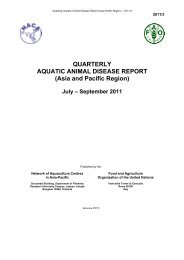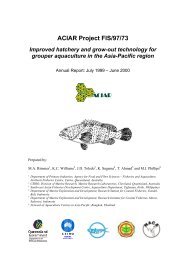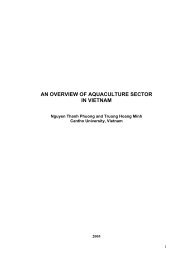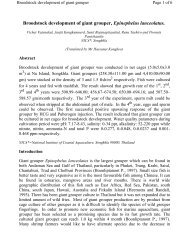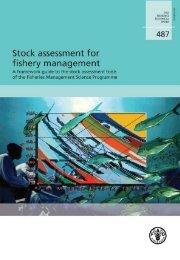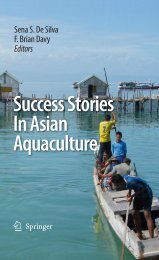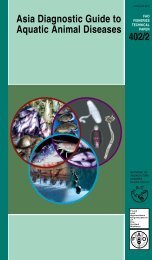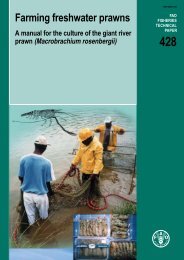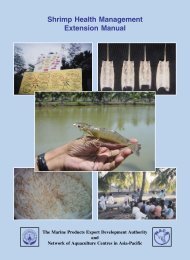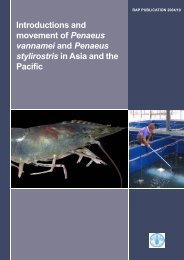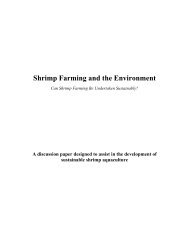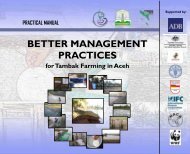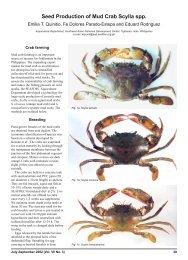(d) Education to children:The <strong>in</strong>volvement <strong>of</strong> women <strong>in</strong> aquaculture has helped <strong>in</strong> many cases to improve the education <strong>of</strong> children. Thepriority women have always given to utilize the <strong>in</strong>come earned from aquaculture is to spend on the education <strong>of</strong>children. In an aquaculture project under operation <strong>in</strong> Tribal area, the women prioritized the benefits <strong>of</strong> aquacultureas an <strong>in</strong>come source to cover the family education and health expenses (Nandeesha, et.al., 2006). As the fish <strong>of</strong>any size can be sold at any <strong>of</strong> the year <strong>in</strong> eastern part <strong>of</strong> India and Bangladesh, farmers always viewed, fish pondas a live bank as they can harvest fish and sell whenever money is needed. Harvest<strong>in</strong>g <strong>of</strong> fish from the culturedponds is still considered as the ma<strong>in</strong> doma<strong>in</strong> <strong>of</strong> men. This contributes the dependence <strong>of</strong> women on men toharvest the fish when needed. In Bangladesh, women were tra<strong>in</strong>ed to harvest fish by cast nett<strong>in</strong>g or by dragg<strong>in</strong>g.Though society viewed this as a manly attitude <strong>in</strong> the beg<strong>in</strong>n<strong>in</strong>g, with the passage <strong>of</strong> time recognition for the newskills acquired by women is seen.(e) Increased susta<strong>in</strong>ability to aquaculture:<strong>Aquaculture</strong> activity has been found to susta<strong>in</strong> and expand when women are actively <strong>in</strong>volved by realiz<strong>in</strong>g thepractical benefits from the activity (Kusakabe and Kelkar, 2001; Nandeesha, et.al., 1994; Nandeesha, 2004). Thepond fish culture activity <strong>in</strong> Cambodia is susta<strong>in</strong>ed by closely l<strong>in</strong>k<strong>in</strong>g with village level seed production and nurs<strong>in</strong>gactivity. Several hatcheries have been established by the farmers themselves, particularly through <strong>in</strong>novationsthat have contributed for the evolution <strong>of</strong> several new type <strong>of</strong> practical hatcheries. In Bangladesh, rice –fish activity<strong>in</strong> the poor regions <strong>of</strong> Northwest has been found to be susta<strong>in</strong>ed with the active <strong>in</strong>volvement <strong>of</strong> women. Infreshwater prawn farm<strong>in</strong>g, education to women to adopt environment friendly aquaculture practices like reduction<strong>in</strong> the usage <strong>of</strong> snail meat, grow<strong>in</strong>g paddy along with prawn as a concurrent crop. Most importantly, large dykesleft unused have now been used for rais<strong>in</strong>g vegetable crops. All this has contributed reduction <strong>in</strong> risk and<strong>in</strong>creas<strong>in</strong>g susta<strong>in</strong>ability <strong>of</strong> the activity. Pesticide usage <strong>in</strong> paddy cultivation has been brought down to m<strong>in</strong>imal andmany farmers grow paddy without us<strong>in</strong>g the pesticide. This has been ma<strong>in</strong>ly accomplished by educat<strong>in</strong>g wife andchildren and exert<strong>in</strong>g <strong>in</strong>direct pressure on the family to avoid us<strong>in</strong>g any harmful substances.(f) Efficient utility <strong>of</strong> the wastes through aquaculture:Participation <strong>of</strong> women <strong>in</strong> aquaculture has shown that all the wastes available from the kitchen and the farm arebest utilized for grow<strong>in</strong>g fish. In Bangladesh, cage culture project experienced the growth <strong>of</strong> fish <strong>in</strong> womenmanaged cages through the better utility <strong>of</strong> wastes. Women ensured regular feed<strong>in</strong>g <strong>of</strong> fish with the left overmaterial from kitchen. In Cambodia, women utilized various types <strong>of</strong> weeds like Lemna, Azolla, termites, etc asfeed to the grow<strong>in</strong>g fish and the bio-resource map developed <strong>in</strong>dicated that farmers used more than twentydifferent wastes as feed to grow fish.Key policy and implementation issues to enhance women participation:<strong>Aquaculture</strong> need women, but whether women need aquaculture?. This is a pert<strong>in</strong>ent question raised by Fels<strong>in</strong>get.al (2000). Clearly, <strong>in</strong>creas<strong>in</strong>g household responsibilities and work load <strong>of</strong> women without ensur<strong>in</strong>g that womenderive the benefit from the new activity will not ensure susta<strong>in</strong>ability. However, aquaculture when carried withadequate care and <strong>in</strong>vestment, yield<strong>in</strong>g much greater return on <strong>in</strong>vestment as compared any other agriculturalactivity carried out by farmers, there is a need to consider aquaculture as a tool to empower women. It should alsobe noted that <strong>in</strong> small scale subsistence aquaculture women <strong>in</strong>volvement is seen, but with the <strong>in</strong>creas<strong>in</strong>g <strong>in</strong>tensity<strong>of</strong> aquaculture, women are excluded from the system (Kusakabe, 2003). This is an important issue that need to beconsidered. With the <strong>in</strong>creas<strong>in</strong>g <strong>in</strong>tensity <strong>of</strong> aquaculture, as the system call for greater degree <strong>of</strong> management andnegotiation with outside agencies for supply <strong>of</strong> <strong>in</strong>puts as well as market<strong>in</strong>g <strong>of</strong> the produce, requir<strong>in</strong>g greaternegotiation appear to reduce women participation. FAO report (2001) po<strong>in</strong>ts out that time and labour can constra<strong>in</strong>women’s greater participation or greater <strong>in</strong>volvement <strong>in</strong> aquaculture. However, Kusakabe (2003) op<strong>in</strong>es that theseare not the major obstacles <strong>in</strong> terms <strong>of</strong> women <strong>in</strong>creas<strong>in</strong>g their decision mak<strong>in</strong>g power <strong>in</strong> aquaculture activities or137
hav<strong>in</strong>g more self confidence through their <strong>in</strong>volvement <strong>in</strong> aquaculture. The critical factor is the resources andknowledge that women have relative to their husbands. Hence, the empowerment programs must keep this <strong>in</strong>m<strong>in</strong>d and do the needful.In small scale aquaculture, women are <strong>of</strong>ten excluded from the system and <strong>of</strong>ten they are restricted to just to carryout some marg<strong>in</strong>al activity like feed<strong>in</strong>g and fertilization, largely because <strong>of</strong> the poor knowledge <strong>of</strong> women aboutaquaculture. Hence, development <strong>in</strong>terventions should specifically target women and fix numerical numbers astargets to ensure that women are reached through such <strong>in</strong>terventions. Prevail<strong>in</strong>g social perceptions that h<strong>in</strong>derwomen participation <strong>in</strong> aquaculture should be addressed through strategic <strong>in</strong>terventions.Provision <strong>of</strong> right <strong>in</strong>put and their proper usage should reduce the risk from aquaculture. To reduce risk further,<strong>in</strong>tegrated farm<strong>in</strong>g systems should be promoted that encourage the resources available on the farm along with the<strong>of</strong>f farm <strong>in</strong>puts to <strong>in</strong>crease productivity to appropriate levels so that w omen <strong>in</strong>volved feel suitably rewarded fromthe aquaculture activity.Creat<strong>in</strong>g suitable market access to the fish and other products produced from the system would help assuredreturn to farmers. Organis<strong>in</strong>g farmers <strong>in</strong> to groups and help<strong>in</strong>g them to undertake group market<strong>in</strong>g would br<strong>in</strong>ggreater benefits. Any activity <strong>in</strong>troduced would only be susta<strong>in</strong>ed only when it br<strong>in</strong>gs good economic returns.Focus <strong>of</strong> any market<strong>in</strong>g system should aim at tapp<strong>in</strong>g the local market and ensure that product producedeconomically viable with local prices.Adopt flexible tra<strong>in</strong><strong>in</strong>g to tra<strong>in</strong> women based on their convenience. Participation <strong>of</strong> women <strong>in</strong> tra<strong>in</strong><strong>in</strong>g programs ata distance from the village made participation by women impossible <strong>in</strong> Eastern India under the DFID programs.Hence, tra<strong>in</strong><strong>in</strong>g <strong>of</strong> women through on-farm participatory approaches with flexible short meet<strong>in</strong>gs with earlyadopters were found to be successful <strong>in</strong> Vietnam (Voetan, 1996). Women seem to benefit far better than menwhen they see the videos related to aquaculture <strong>in</strong> Northeast Thailand.<strong>Aquaculture</strong> has been perceived to be an activity suited more for men <strong>in</strong> many societies. To harness the power <strong>of</strong>this activity realized centuries ago by Fan Li <strong>in</strong> Ch<strong>in</strong>a, there is urgent necessity to <strong>in</strong>fluence Governments anddevelopment agencies to evolve suitable policies that promote gender balanced development. Fortunately, withthe <strong>in</strong>creas<strong>in</strong>g awareness raised on the gender issues <strong>in</strong> aquaculture, beg<strong>in</strong>n<strong>in</strong>g with the FAO workshop <strong>in</strong> 1987on “Women <strong>in</strong> <strong>Aquaculture</strong>”, there have been some conscious efforts to address the issue, particularly by theNGO community. In Bangladesh, perspective plan developed for the aquaculture development does state aboutthe need for specific focus on women <strong>in</strong> aquaculture development. With a number <strong>of</strong> donors <strong>in</strong>volved <strong>in</strong>development work and most <strong>of</strong> them pay<strong>in</strong>g due attention to gender issues, the approach <strong>of</strong> the Government hasbeen gender balanced. Several <strong>of</strong> the NGOs work<strong>in</strong>g <strong>in</strong> Bangladesh have played major role <strong>in</strong> chang<strong>in</strong>g thesociety perception on women and have provided support to their active <strong>in</strong>volvement <strong>in</strong> various activities. InSoutheast Asian countries, the Women <strong>in</strong> Fisheries <strong>Network</strong> established <strong>in</strong> various countries and supported by theMekong River Commission have been play<strong>in</strong>g active role at the national level <strong>in</strong> terms <strong>of</strong> <strong>in</strong>fluenc<strong>in</strong>g policy bygenerat<strong>in</strong>g adequate amount <strong>of</strong> research <strong>in</strong>formation rais<strong>in</strong>g relevant issues on women <strong>in</strong> fisheries andaquaculture and <strong>in</strong>fluenc<strong>in</strong>g the Governments to evolve suitable programs. In Africa, ALCOM project <strong>of</strong> FAO madean attempt to raise relevant gender issues <strong>in</strong> aquaculture and <strong>in</strong>fluence the Governments <strong>in</strong> evolv<strong>in</strong>g appropriatepolicies.Clearly, so far no Governments have come up with suitable policies and programs to address the issue. However,with the <strong>in</strong>creas<strong>in</strong>g recognition <strong>of</strong> the issues, there is opportunity to <strong>in</strong>fluence the relevant agencies to have gendersensitive policies. To appreciate the issues related to gender, the employees <strong>of</strong> the Department <strong>of</strong> Fisheries needto be sensitized on gender issues. Gender sensitization is an urgent necessity and should be done at all levels.Once the staff <strong>in</strong>volved <strong>in</strong> development recognize and understand the issue, there will be better susta<strong>in</strong>ability forthe programs <strong>in</strong>itiated.138
- Page 1 and 2:
Training of TrainersProgramme3-7 Au
- Page 3 and 4:
Table of Contents1. Preface 42. Sen
- Page 5 and 6:
knowledge about the activities carr
- Page 7 and 8:
iosphere, in that it is essentially
- Page 10 and 11:
Importance in narrowing the supply
- Page 12 and 13:
Figure 7: The trend in aquaculture
- Page 14:
aquaculture has been a success thus
- Page 17 and 18:
pathogen transfer is generally cons
- Page 19 and 20:
• It highlights the importance a
- Page 21 and 22:
particular animal are identified, t
- Page 23:
Knowledge at the bottom of the pyra
- Page 26 and 27:
farmer innovation process. In this
- Page 28 and 29:
• Rapport building• Working str
- Page 30 and 31:
shrimp farming is undertaken in the
- Page 32 and 33:
Reintjes, C and Hiemstra, W. 1989 F
- Page 34 and 35:
• An increase in reliable product
- Page 36 and 37:
Principles of AACC are to: 1) Facil
- Page 38 and 39:
Maintaining genetic quality of fish
- Page 40 and 41:
Where F is the percent increase in
- Page 42 and 43:
o G=(0.95) 1/10G =0.994883803Figure
- Page 44 and 45:
Aquaculture extension and training
- Page 46 and 47:
ResearchExtensionFarmersFlow of inf
- Page 48 and 49:
view of outside world than before a
- Page 50 and 51:
Along with fish sample, the support
- Page 52 and 53:
Fungal examinationFungal infection
- Page 54 and 55:
few different pathogen strains. The
- Page 56 and 57:
Major finfish diseases in Asia and
- Page 58 and 59:
A great number and diversity of ani
- Page 60 and 61:
• -oxidase test positive• -resi
- Page 62 and 63:
ReferencesAustin, B. and D. Austin.
- Page 64 and 65:
Accessing better markets-improving
- Page 66 and 67:
Owing to its importance in generati
- Page 68 and 69:
adopt standards for responsible shr
- Page 70:
Tokrisna R, Benheam W., 1995. Gain
- Page 73 and 74:
of the temperature rise that were d
- Page 75 and 76:
Principles of developing, validatin
- Page 77 and 78:
such as determinants, exposures and
- Page 79 and 80:
How to promote adoption of BMPs?Pro
- Page 81 and 82:
economic sustainability. BMPs need
- Page 83 and 84:
Once you understand your stakeholde
- Page 85 and 86:
As conventional approaches such as
- Page 87 and 88: Printed publicationsPrinted publica
- Page 89 and 90: Set up a blog or website for your w
- Page 91 and 92: If you have a website, all you need
- Page 93 and 94: ought about increased profits among
- Page 95 and 96: • It is a farming system the prod
- Page 97 and 98: Annex 1. The area surveyed for obta
- Page 99 and 100: contribute substantially to maintai
- Page 101 and 102: seawater, but in fresh water its le
- Page 103 and 104: type of ingredients used, since som
- Page 105 and 106: This is a new approach used to buil
- Page 107 and 108: New, M.B., A. G. J. Tacon and I. Cs
- Page 109 and 110: later stages it has become a much m
- Page 111 and 112: c. Improved information exchange an
- Page 113 and 114: implemented by both societies. Inte
- Page 115 and 116: With better informed farmers, the s
- Page 117 and 118: According to FAO, it is estimated t
- Page 119 and 120: Farmer organization as models for p
- Page 121 and 122: NaCSA disseminates BMPs mainly thro
- Page 123 and 124: 1. Drain the pond water completely
- Page 125 and 126: Seed transportation and Stocking:
- Page 127 and 128: 7. Presently 100% of the society po
- Page 129 and 130: would help in sustaining shrimp sec
- Page 131 and 132: Stress brought about by the capture
- Page 133 and 134: Enhance women participation in aqua
- Page 135 and 136: women in aquaculture and identify a
- Page 137: major percentage of staff, the need
- Page 141 and 142: Overall status of men and women in
- Page 143 and 144: Compliance to international standar
- Page 145 and 146: (ii) to protect human or animal lif
- Page 147 and 148: c) FAO/WHO Codex Alimentarius Commi
- Page 149 and 150: Annex 1: List of participantsCountr
- Page 151 and 152: Annex 2: AgendaDate Time Presentati
- Page 153: Annex 3: List of resource persons1.



